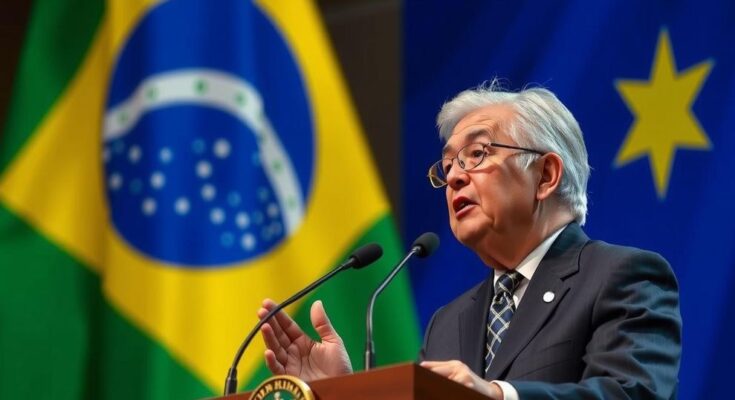Brazilian President Lula introduced a global initiative at the G20 Summit to tackle poverty and hunger, emphasizing climate change’s impact. The meeting, overshadowed by conflicts such as the wars in the Middle East and Ukraine, gathered 81 nations, including major powers. President Biden’s involvement also highlights U.S. policy shifts relevant to global alliances and climate discussions.
During the Group of 20 Summit hosted in Rio de Janeiro, Brazilian President Luiz Inacio Lula da Silva launched a global initiative aimed at combating poverty and hunger. In his opening remarks, President Lula stressed that these social issues arise from political decisions and emphasized the critical need for decisive actions against climate change. The initiative, which garnered support from 81 nations including 18 G20 countries and various international organizations, signifies a collaborative resolve to address these urgent global challenges, despite geopolitical tensions overshadowing the summit. The summit occurs amidst significant international conflicts, including wars in the Middle East and Ukraine. Noteworthy topics on the agenda include the dynamics of the ongoing conflicts, though they are not formally listed. Discussions are expected to dominate informal meetings among leaders, highlighting competing interests within the G20. President Lula has seized this opportunity to advocate for initiatives that align with his administration’s priorities, focusing on alleviating hunger, climate action, and addressing income disparities. Within this context, U.S. President Joe Biden attended the G20, potentially marking his last summit, as he seeks to solidify his climate achievements before concluding his term. Unfolding developments around U.S. military support for Ukraine have raised deliberations about alliances among G20 members and their respective stances on climate finance for developing nations. Consensus among G20 leaders is essential to break current stalemates in international climate negotiations. In tandem with these discussions, Chinese President Xi Jinping has proposed a cooperative venture with Brazil, South Africa, and the African Union aimed at enhancing technological innovations in the Global South, reflecting the evolving geopolitical landscape. Security measures were particularly heightened during the summit following a recent violent incident targeting Brazil’s Supreme Court. Leaders are called upon to exhibit the required commitment to both socio-economic equality and climate leadership on this crucial international stage.
The Global Alliance launched by President Lula at the G20 Summit seeks to unite nations in the pursuit of alleviating poverty and hunger. This initiative also emphasizes addressing climate change, which is increasingly recognized as a fundamental contributor to global inequity. The gathering, featuring major world economies, takes place amid significant tensions due to ongoing conflicts in the Middle East and Ukraine, which have implications for global economic cooperation. The discussions highlight a critical moment for leadership and unity among G20 members, particularly concerning climate commitments and social equity.
The G20 Summit in Rio de Janeiro, while focused on poverty and hunger through President Lula’s new alliance, is significantly influenced by geopolitical tensions. The pressing need for collaborative climate action and social responsibility underscores the essence of the summit. As discussions unfold, the ability of G20 leaders to navigate their differences may determine the effectiveness of global initiatives aimed at fostering a fairer world while addressing pressing climate challenges.
Original Source: www.aljazeera.com




